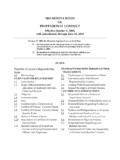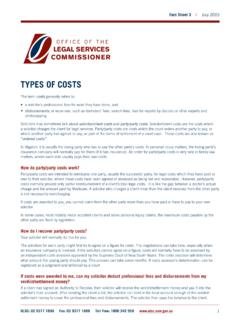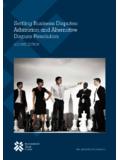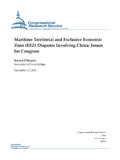Transcription of William J. Wernz, Director Minnesota Office of Lawyers ...
1 OPINION 13: COPYING COSTS ByWilliam J. Wernz, DirectorMinnesota Office of Lawyers professional responsibility Reprinted from Bench & Bar of Minnesota (August 1989) disputes over fees and costs, and an attorney s right to hold property while the dispute is resolved, haveled to numerous professional responsibility complaints over the years. The law needed to resolve thesedisputes--involving lien rights, contract and personal property law, and the Rules of professional Conduct--seems disproportionately complex for resolution of what are often small commercial Lawyers professional responsibility Board has, from time to time, attempted to give guidance on suchdisputes.
2 The Minnesota Supreme Court has authorized the board to "issue opinions on questions ofprofessional conduct." Among these opinions is Opinion 11, which in part provides, "It is professionalmisconduct for an attorney to assert a retaining lien on the files and papers of a client."The board has recently issued Opinion No. 13, which further defines what are and are not "files and papersof a client" and which addresses professional responsibility obligations related to "Copying Costs of ClientFiles, Papers and Property." The board adopted Opinion 13 on the recommendation of the Board OpinionCommittee, consisting of attorneys Rollin Whitcomb and Julius Gernes and public member Gwenyth issue of who bears copying costs has been addressed by numerous state and local ethics committeesaround the country.
3 One appellate court, interpreting a statute and Rule (d), Rules of ProfessionalConduct, has determined that after termination of representation an attorney must deliver file documents toa client without conditioning such delivery upon copying costs. McKim v. State, 528 484 (Ind. ). Opinion 13 is consistent with the opinion of a majority of jurisdictions considering the to certain exceptions, the general views of Opinion 13 are that:1. File contents belong to the client and must be turned over to the client upon Costs of creating a duplicate file for the attorney to retain must be borne by the attorney unless the clientagrees in advance to bear the The lawyer may not hold the file until copying costs or legal fees are paid (See Opinion 11).
4 Several exceptions from these general statements are recognized. Unexecuted or unserved documentsprepared by the lawyer, but not yet paid for, do not belong to the client; they do not have to be turned overto the client on request unless substantial prejudice, such as expiration of a statute of limitations, wouldotherwise result. In the nonlitigation setting, documents such as unexecuted estate plans would not have tobe turned over to the client who has not paid for the lawyer's drafting 13 is rooted in several rules of professional conduct: Rule (b)(4) (requiring prompt delivery ofproperty "which the client is entitled to receive"); Rule (d) (providing that on termination ofrepresentation a lawyer shall take reasonable steps to protect a client, including "surrendering papers andproperty to which the client is entitled"); and Rules and (d).
5 Rule (requiring reasonable fees) is the basis for Opinion 13's statement that copying costs must bereasonable. Sometimes Lawyers have refused to deliver client files until the client has paid a per pagecopying cost which greatly exceeds the cost a commercial service would charge. If the attorney cannot copythe file at a reasonable cost , the unreasonable excess should not be passed on to the (d) (forbidding conduct "prejudicial to the administration of justice") is another, somewhat moreremote source for Opinion 13. disputes between Lawyers and clients over access to files can affect thirdparties.
6 A client may be forced to request a continuance until the file is delivered, thereby affecting both thecourt and an opposing party. Moreover, a client's freedom to choose counsel can be compromised by alawyer s withholding routinely advise clients how to plan, during a harmonious business or personal relationship, fordefining their rights and duties when the relationship is dissolved, harmoniously or otherwise. Attorney-client relationships also come to an end. It is hoped that Opinion 13, and Opinion 11, will clarify attorneys rights and duties with respect to a client s file when representation is ended.
7 The text of Opinion 13 is asfollows: Opinion No. 13: Copying Costs of Client Files, Papers and PropertyClient files, papers and property, whether printed or electronically stored, shall include:1. All papers and property provided by the client to the All pleadings, motions, discovery, memorandums, and other litigation materials which have beenexecuted and served or filed regardless of whether the client has paid the lawyer for drafting and servingand/or filing the document(s).3. All correspondence regardless of whether the client has paid the lawyer for drafting or sending All items for which the lawyer has advanced costs and expenses regardless of whether the client hasreimbursed the lawyer for the costs and expenses including depositions, expert opinions and statements,and other materials which may have evidentiary files, papers and property, whether printed or electronically stored, shall not include:1.
8 Pleadings, discovery, motion papers, memoranda and correspondence which have been drafted, but notsent or served if the client has not paid for legal services in drafting or creating the In nonlitigation settings, client files, papers and property shall not include drafted but unexecuted estateplans, title opinions, articles of incorporation, contracts, partnership agreements, or any other unexecuteddocument which does not otherwise have legal effect, where the client has not paid the lawyer for theservices in drafting the document(s).A lawyer who has withdrawn from representation or has been discharged from representation may chargea former client for the costs of copying or electronically retrieving the client's files, papers and propertyonly if the client has, prior to termination of the lawyer's services, agreed in writing to such a charge.
9 Suchcopying charges must be reasonable. Copying charges which substantially exceed the charges of acommercial copy service are normally lawyer may not condition the return of client files, papers and property on payment of copying may the lawyer condition return of client files, papers or property upon payment of the lawyer's Opinion No. 11 of the Lawyers professional responsibility lawyer may withhold documents not constituting client files, papers and property until the outstandingfee is paid unless the client's interests will be substantially prejudiced without the documents.
10 Suchcircumstances shall include, but not necessarily be limited to, expiration of a statute of limitations or someother litigation-imposed deadline. A lawyer who withholds documents not constituting client files, papersor property for nonpayment of fees may not assert a claim against the client for the fees incurred inpreparing or creating the withheld documents(s).

















